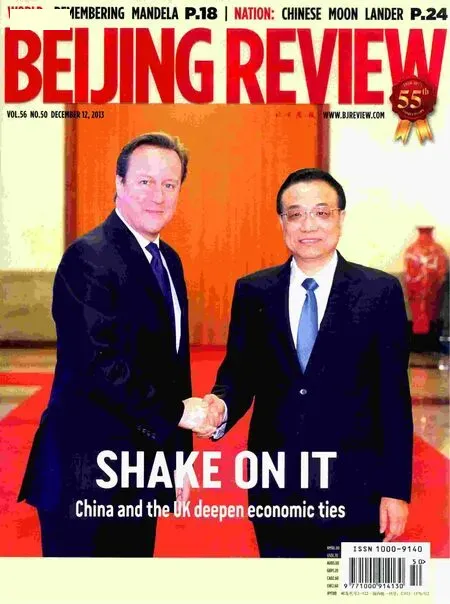BRITAIN: BACK ON BOARD
By Yu Lintao

David Cameron finally made it on his China trip after a fairly long delay caused by his meeting with the Dalai Lama one and a half years ago, with a renewed emphasis on the importance of mutual respect in bilateral relations.
Observers claimed that the postponement should not be seen in a negative light, as it has allowed British politicians to reconsider the importance of China-Britain relations; additionally, the already delayed visit became a crucial opportunity to bring China-Britain relations back on the right track.
“There is no unsolvable conflict of interest between China and Britain,” said Ma Zhengang, former Chinese Ambassador to Britain. Only by mutually respecting the major concerns of each other could the two countries develop a sound bilateral relationship, he added.
He also claimed the latest Beijing trip by Cameron has restarted an annual ChinaBritain premier meetings, marking a thaw in Sino-UK relations.
Turning the page
Heading an unprecedentedly large delegation consisting of several cabinet members as well as about 150 representatives from business and trade sectors, Camerons Beijing trip was arguably one of Britains most important diplomatic events this year.
Cameron has apparently done his homework ahead of his visit, having opened an account on Sina Weibo, Chinas Twitter-like microblog website, visited a Chinese artwork exhibition in London to learn about Chinese culture, given an interview with Chinese media as well as publishing an article in a Chinese news magazine. These efforts reflect the importance he attached to the trip.
British media remarked that Number 10 is billing the trip as an opportunity to“turn the page” after the row that followed Camerons meeting with the Dalai Lama and to reopen top-level ties with the worlds second largest economy.
However, former ambassador Ma noted the erosion of mutual trust and the damage to bilateral relations caused by the Cold War mentality of British society, which he said views China through “tinted spectacles.”“Some British are too critical of Chinas social system,” said Ma.
Cui Hongjian, director of the Department for European Studies with the China Institute of International Studies (CIIS), said mutual trust should be improved to eliminate the barricades between the two sides. “Without mutual political trust, economic relations and cooperation in other fields will be affected. It is not conducive to a healthy and comprehensive Sino-UK relationship,” Cui said.
The British side should make sure that it will not make opportunistic mistakes when involving itself in issues concerning Chinas core interests in the future, said Cui.
Before his arrival in Beijing, Cameron made a pledge to lead a “dialogue of mutual respect and understanding.”
The trip appeared to have fulfilled his pledge. In addition to meeting with Chinese leaders, Cameron met with local businesspeople to advance cooperation and gave a lecture at a university to make a good impression with Chinese students within the three-day visit.
At a news conference with Premier Li Keqiang after talks at the Great Hall of the People, the UK prime minister said, “I see Chinas rise as an opportunity not just for the people of this country but for Britain and the world.”
He also criticized opponents of trade liberalization with China, saying that Britain wants China to realize its dream and he believes the two countries can help each other succeed in the global race. “An open Britain is the ideal partner for an opening China ... No country in the world is more open to Chinese investment than the United Kingdom,” he said.
Kerry Brown, Executive Director of China Studies Center with the University of Sydney, claimed practical cooperation itself could be an efficient way to enhance mutual trust between the two countries.
“Accept that in many areas they (China and Britain) have different values and beliefs, and just focus on practical things like business and other cooperation. They will build trust, not nice words and rhetoric,” said the professor to Beijing Review in a written interview.
Seeking opportunities
At a business luncheon with hundreds of Chinese and British business leaders in Shanghai on December 3, Cameron urged British entrepreneurs to hold onto their Chinese opportunities firmly.
Observers believe it is the enormous Chinese market that brought Cameron to head the largest UK trade delegation to China.
Brown told Beijing Review that it is “probably because the United Kingdom knows that investment potential from China is huge, and this follows on from the visit by the chancellor for finance a month ago from Britain to China which underlined how much business can be done with China.”
Camerons visit to China follows those by British Finance Minister George Osborne and the Mayor of London, Boris Johnson, who recently visited Beijing and Hong Kong to drum up investment and try to sell London as the top financial center in facilitating the internationalization of the Chinese yuan.
Cui, of the CIIS, also acknowledged that the vast trade interests and the economic interdependence between the two countries are the major impetus of Camerons visit.
The British Government is currently seeking a fundamental change in its economic growth, after its banking business—one of the critical support industries—has struggled to deal with the EU debt crisis. As cash flow has declined, economic opportunities have dried up.
As the European continent is still mired in the crisis and U.S. debt is at a record high, China, as the second largest economic power with the largest foreign exchange reserves, has become an important source of capital for London bankers.
Cui said that China has become a political and economic force that cannot be ignored. Britain should take advantage of Chinas economic rise to seek its own economic expansion.
In the past, Britain used to serve as a capital and technology provider during Sino-UK cooperation, while China was a destination for UK investment. But this time, Cameron and his delegation tried to attract more Chinese investment to the UK.
Statistics show that investment from the Chinese mainland in Britain has been increasing rapidly and the UK is now one of the most popular destinations for the Chinese mainlands outbound investment after Hong Kong and the United States. The overall stock of Chinese investments in Britain is about $9 billion while Britain has roughly double that amount of investments in China. Bilateral trade is also on the rise. The latest data from Chinese Customs show that Britain became Chinas second largest trade partner in the EU in the first 10 months of 2013.
Upon his arrival in China, the British prime minister witnessed a signing ceremony of British vehicle makers Jaguar Land Rover for a deal worth £4.5 billion ($7.38 billion) to provide 100,000 cars to the National Sales Co. in China, which means providing indirectly 38,000 jobs in Britain.
During the visit, China and the UK also signed 10 agreements on areas ranging from space exploration to enhancing mutual investment. Breakthroughs were made in high-speed railways and nuclear energy cooperation between the two.
Concerning the financial sector, the two sides discussed conducting offshore renminbi business in London and Chinese banks opening branches in Britain.
The Agricultural Bank of China (ABC) and the Standard Chartered Bank signed a memorandum of understanding, through which financial institutions and corporations can work with Standard Chartered UK and ABC UK to execute renminbi transactions. London, therefore, as the worlds leading financial hub will—along with Hong Kong, Singapore and Chinese Taipei—become a key outpost for offshore yuan trade.
Standard Chartered Group CEO Peter Sands, who accompanied Cameron on his second visit to China, believes that the emergence of multiple offshore yuan hubs has brought opportunities to banks like Standard Chartered and HSBC as they help Chinese companies issue yuan-denominated bonds overseas.
Cui remarked that conducting offshore renminbi business in London will further enhance the metropolis position as a leading international financial center and bring concrete benefits to the UK.
Cui also pointed that China unveiled a transformative new economic strategy in the recently concluded Third Plenary Session of the 18th Central Committee of the Communist Party of China, which has sent a positive indicator of opportunity to the outside world.
“Policies, including opening up banking business, and promoting low-carbon growth, released at the conference mean improved prospects for Britain, which has comparative advantages in those fields. In taking advantage of Chinas second round of reform, it will create bright economic prospects for Britain,” said Cui.
Observers claim that Camerons latest China trip was also an important opportunity for Chinese enterprises.
Wang Yiwei, a research fellow on European studies with Beijing-based Renmin University, noted that as the birthplace of the Industrial Revolution, the UK faces problems with aging infrastructure and a hollowing out of industry, with three quarters of its economy now composed of financial services. Meanwhile, China, as a new industrial country, has many late-comer advantages in infrastructure construction fields, including high-speed rail and nuclear power technologies.
“The British Government has released a£33-billion ($52.3-billion) bill of infrastructure and housing projects. It is an opportunity for Chinas excess infrastructure capital to be invested,” said Wang.

